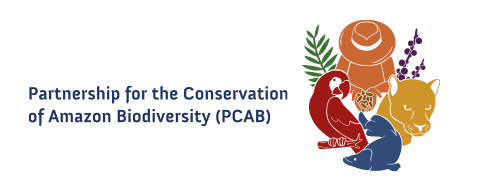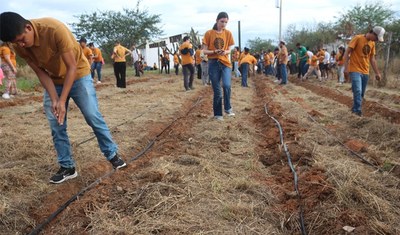Amazônia: Seeds for ecological restoration
August/September, 2024 (*) – More than 150 women and men from all over Brazil came together in July for their annual meeting. What they had in common was knowledge and, in their hands, the most important thing of all, namely seeds. The desire to exchange experiences and knowledge was the main motivation for everyone at the 3rd meeting of the Redario, an organization of networks and groups of native seed collectors to supply the large-scale restoration chain.
Redário promotes the development of native seed networks, mainly community-based, through associations and cooperatives of traditional populations (Indigenous, quilombolas) and small farmers. Production and planting have been carried out in five biomes, concentrated in 12 states located in the Atlantic Forest, Cerrado and Amazon biomes.
Held in the city of Juazeiro, in the state of Bahia, on the eve of the 5th Brazilian Ecological Restoration Conference, the 3rd Redário Meeting brought together ecological restoration collectors, specialists and researchers. The program included activities such as training sessions and interactions aimed at strengthening the networks that have already been established as well as those that are in the process of being set up, visits to restoration areas in the Caatinga biome and social technologies in the semi-arid region, as well as the planting of a mixture of seeds and the traditional seed exchange event.
Experience - Jimi Amaral, the Agroecological Transition coordinator at the International Forestry Research Center and the International Agroforestry Research Center (CIFOR-ICRAF) in Brazil, took part in the meeting’s activities, representing the institution and the Regenerative Agriculture for the Conservation of the Amazon (ARCA) program which supported the event.
The ARCA program is funded by USAID and involves four of CIFOR-ICRAF’s strategic partners - Instituto Socioambiental (ISA), Instituto Sociedade População e Natureza (ISPN), Instituto Ouro Verde (IOV) and The Nature Conservancy (TNC) Brasil.
The event’s objective was to interact with and learn from seed collectors from networks that have already been set up in order to take this experience to the north-east of the state of Pará, where ARCA will support the establishment and creation of seed collecting networks. “Having contact and interaction with the seed collecting groups that make up the networks was very important for learning a little bit about how different organizational structures work, the division of tasks and the process of selling and distributing the benefits among collectors,” says Jimi Amaral.
The Agroecological Transition coordinator highlighted the work of a network in Rondônia that organizes seed collection in settlements, conservation areas and Indigenous and quilombola lands. Visits are made and leaders mobilized, the species that exist in the territory are identified and those that have potential for restoration and commercialization are chosen and, last but not least, the collection schedule is drawn up.
Each community has a person who is responsible for organizing the families and the collection and communicating with the team from the institution that is intermediating the sale. As for the income from the sale of seeds, 60% goes to the collectors and 40% is set aside to cover logistics and operating costs.
“It was possible to understand the processes, which work well, and I believe it will be possible to reproduce the protocols that have been built up over the years with adaptations to the context of the north-east of the state of Pará, to encourage collection and supply the region. Understanding and integrating our institution into this process of collecting seeds for restoration is very positive,” says Jimi Amaral.
Pará has the ambitious goal of becoming carbon neutral in terms of land and forest use by 2036 and part of this goal entails the restoration of 5.4 million hectares by 2030. Although most of this target is earmarked for assisted natural restoration, it still requires millions of seeds and seedlings and this represents a growing demand for seeds. “The ARCA program aims to carry out engagement and training actions to strengthen strategies that contribute directly or indirectly to achieving these goals,” Amaral explained.
Networks benefit people and nature – “Seed networks are fundamental in the restoration chain, because the market needs large quantities and good quality seeds. And the networks have this potential,” says Aline Smychniuk, socio-environmental analyst and manager of the Guaporé Ecological Action Seed Center (Ecoporé).
The Amazon Bioeconomy Seed Network (RESEBA), of which Aline is a member, currently has 300 registered seed collectors. These seed collectors include Indigenous people from nine ethnic groups (Suruí, Aikanã, Tupari, Zoró, Gavião, Kampé, Macurape, Karitiana and Apurinã), as well as extractivists, quilombolas, rural producers and urban collectors. The collectors are all over the state of Rondônia, the northern part of the state of Mato Grosso and the southern part of the state of Amazonas.
RESEBA works with 110 species and offers training for collectors, focusing on good practices in relation to the collection, processing and storage of seeds. Aline Smychniuk, who was elected as one of the three representatives of community-based networks to make up the Redário Management Committee, believes that the initiative can be beneficial in a number of ways, since “as well as fostering the restoration market, there’s also the social issue, offering the possibility of generating income for the families of the collectors and boosting the territories’ bioeconomy”.
(*) Written by Denise Oliveira e Vitória Alves, from CIFOR-ICRAF


